BOONE, N.C. — Beginning in fall 2026, Appalachian State University will welcome its first cohort of students to a hybrid Doctor of Nursing Practice (DNP) degree program, designed to educate family practice nurse practitioners and respond to health care provider shortages, especially in rural areas.
The DNP program, which received approval from the University of North Carolina System Board of Governors on Nov. 14, holds the distinction of being the university’s first doctoral degree program in the field of health sciences. App State currently offers doctoral programs in clinical psychology (PsyD) and educational leadership (EdD).
“Offering a doctoral program in nursing practice advances App State’s strategic plan of delivering academic programs that are innovative and relevant to the needs of our rural communities and region," said App State Interim Chancellor Heather Norris. "Nurse practitioners serve a critical role in extending access to and availability of health care in our state.”
In North Carolina, 38 of 100 counties do not currently meet recommended health care staffing ratios. The need for trained health care providers is even more pronounced in rural areas such as Western North Carolina.
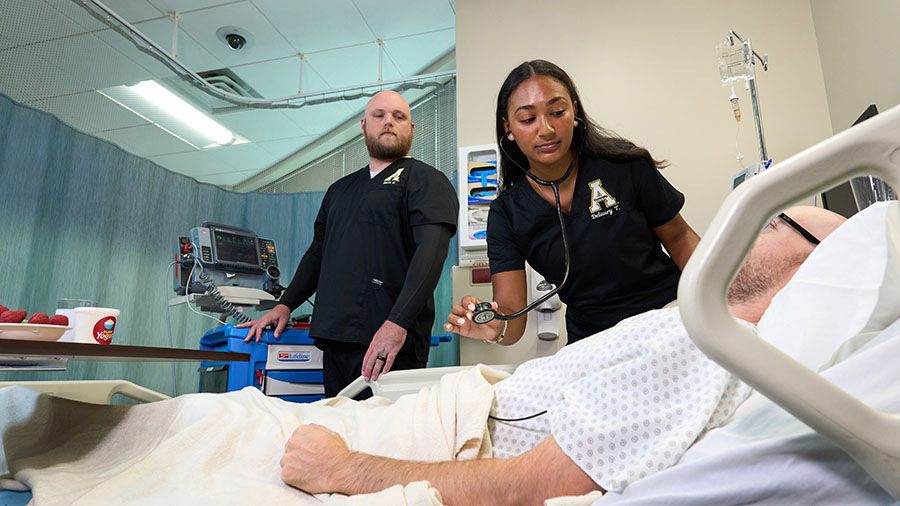
App State nursing majors Gavin Christian, a senior from Lenoir, far left, and Delaury Then, a junior from Raleigh, center, utilize an advanced nursing simulation laboratory for clinical training in App State’s Levine Hall of Health Sciences. The university’s new Doctor of Nursing Practice (DNP) program, which was approved by the University of North Carolina System Board of Governors on Nov. 14, will utilize a similar high-tech patient simulation laboratory space that is planned for the App State Hickory campus. Photo by Troy Tuttle
According to the U.S. Bureau of Labor Statistics, nurse practitioner jobs are projected to grow by 45% from 2023 to 2033 — much faster than the average for all occupations. Nearly 30,000 new advanced practice registered nurses will be needed each year through 2031 to meet the rising demand for care.
App State’s DNP will be part of the Beaver College of Health Sciences’ Department of Nursing, which offers two bachelor’s degrees in nursing and an online Master of Science in Nursing. All App State nursing degree programs are accredited by the Commission on Collegiate Nursing Education.
“App State’s doctorate in nursing practice will complement our existing undergraduate and graduate nursing degree programs by providing pathways for future family health care providers as well as nursing educators, further strengthening the nursing workforce in our region,” said App State Acting Provost Neva J. Specht.
About the DNP program at App State
An initial cohort of seven students is anticipated for the DNP program, with the university projecting that a total of 77 students will be enrolled in the program by its fifth year of operation, in 2030. DNP students will complete the majority of the program’s coursework online, with one week of each semester spent at the App State Hickory campus to engage in more intensive clinical training utilizing the high-tech nursing simulation laboratory space that is planned for the campus.
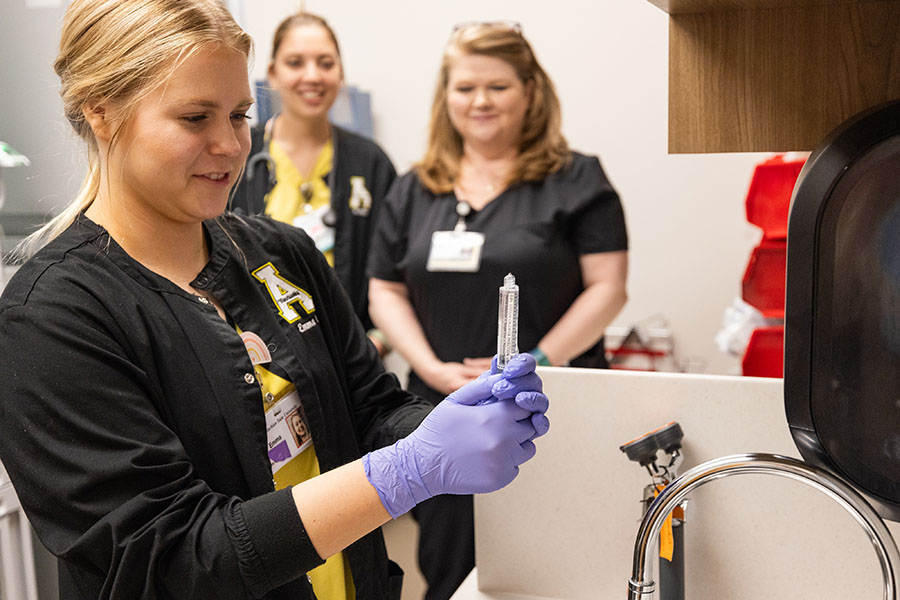
App State senior nursing major Emma Cheek, of Yadkinville, pictured in the foreground, participates in a recent clinical rotation at UNC Health Appalachian’s Watauga Medical Center in Boone. Beginning in fall 2026, App State’s Department of Nursing will offer a hybrid Doctor of Nursing Practice (DNP) program, in addition to its bachelor’s and master’s programs in nursing. Photo by Chase Reynolds
App State plans to offer three concentrations as part of its DNP program — nursing education, public/policy health, and health care administration — with the goal of preparing nurses to become nurse practitioners with a focus on family practice.
“Our concentrations provide opportunities for specialization for future nurse practitioners who will be equipped to treat people over their entire lifespan,” said Dr. Marie Huff, dean of App State’s Beaver College of Health Sciences. “App State’s experienced nursing faculty are excited to launch this program, which will continue building the legacy of our excellent Mountaineer nurses.”
Depending on their chosen concentration, graduates will be prepared to serve as family nurse practitioners who receive specialized training in nursing education or staff development, public and population health, or private practice.
The part-time program, to be completed in 12 semesters or four years, including Summer Sessions, is designed for nurses with a bachelor’s degree who want a seamless pathway to earning a doctoral degree. Among the requirements for prospective DNP students:
- an earned Bachelor of Science in Nursing degree;
- a current North Carolina nursing license; and
- at least one year of experience working as a clinician.
Meeting the demand for rural practitioners
The demand for clinical practitioners in rural areas is even more pronounced than in urban areas, with the American Association of Colleges of Nursing projecting the national nursing shortfall will increase as additional baby boomers age and their health care needs grow.
Across the United States, less than 5% of resident physicians choose to practice in rural communities, and in North Carolina, a review of 2,170 graduating doctors over 10 years showed that only 42 (1.9%) were practicing primary care in rural North Carolina, Huff shared.
“One of our goals in expanding educational opportunities for prospective DNPs is to impact the health and well-being of our neighbors in Western North Carolina,” said registered nurse Dr. Tammy Haley, professor in and chair of App State’s Department of Nursing. “By offering the in-person portion of this program at our Hickory campus, we will offer a convenient location for a broader population of nurses to have an even greater impact on rural health and the region.”
What do you think?
Share your feedback on this story.
UNC System awards $29 million in grants to expand nursing education
About the Department of Nursing
The Department of Nursing in Appalachian State University’s Beaver College of Health Sciences provides an evidence-based nursing education in an intellectually stimulating and challenging environment that is designed to prepare the beginning nursing professional with the knowledge and skills to practice in diverse settings in a highly complex health care system. The department offers two accredited Bachelor of Science programs: the nursing pre-licensure program and the online RN to BSN program, designed for current registered nurses seeking the bachelor’s degree. The department also offers a Master of Science in nursing program that prepares registered nurses for leadership roles as educators. Learn more at https://nursing.appstate.edu.
About the Beaver College of Health Sciences
Appalachian State University’s Beaver College of Health Sciences (BCHS), opened in 2010, is transforming the health and quality of life for the communities it serves through interprofessional collaboration and innovation in teaching, scholarship, service and clinical outreach. The college enrolls more than 3,600 students and offers 10 undergraduate degree programs, nine graduate degree programs and four certificates across seven departments: Kinesiology, Nursing, Nutrition and Health Care Management, Public Health, Recreation Management and Physical Education, Rehabilitation Sciences, and Social Work. The college’s academic programs are located in the Holmes Convocation Center on App State’s main campus and the Levine Hall of Health Sciences, a state-of-the-art, 203,000-square-foot facility that is the cornerstone of Boone’s Wellness District. In addition, the college supports the Appalachian Institute for Health and Wellness and has collaborative partnerships with the Wake Forest University School of Medicine’s Physician Assistant Program, UNC Health Appalachian and numerous other health agencies. Learn more at https://healthsciences.appstate.edu.
About Appalachian State University
As a premier public institution, Appalachian State University prepares students to lead purposeful lives. App State is one of 17 campuses in the University of North Carolina System, with a national reputation for innovative teaching and opening access to a high-quality, cost-effective education. The university enrolls more than 21,000 students, has a low student-to-faculty ratio and offers more than 150 undergraduate and 80 graduate majors at its Boone and Hickory campuses and through App State Online. Learn more at https://www.appstate.edu.

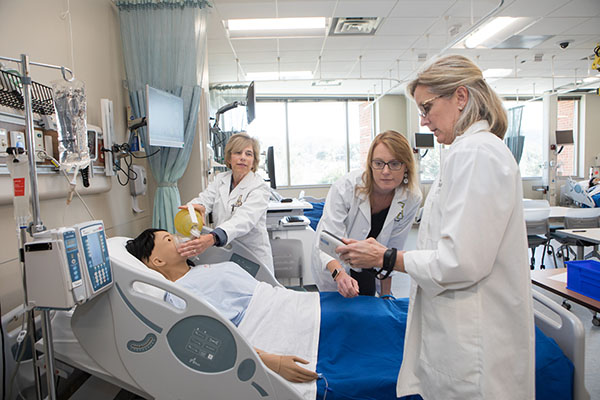
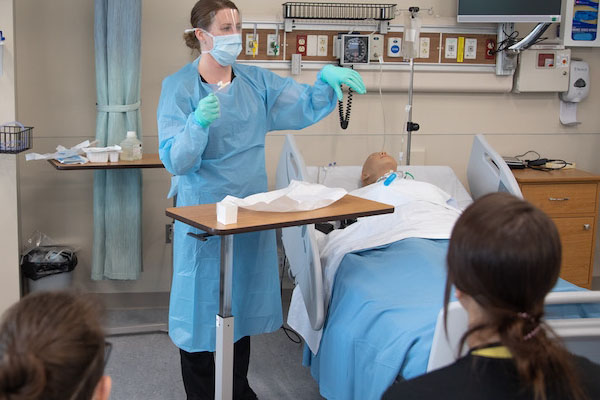
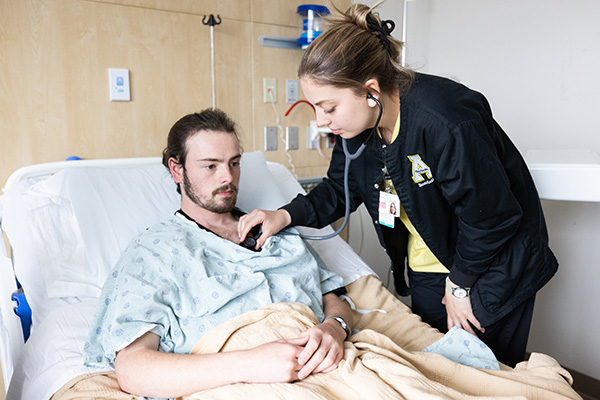




![How NCInnovation Is Rethinking Economic Development in North Carolina [faculty featured]](/_images/_posts/2026/02/rethinking-economic-development-600x400.jpg)






